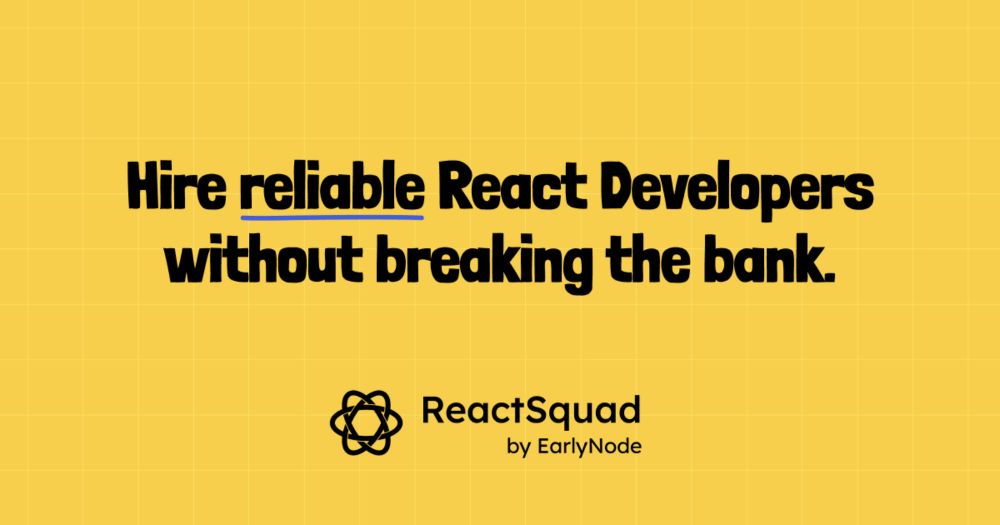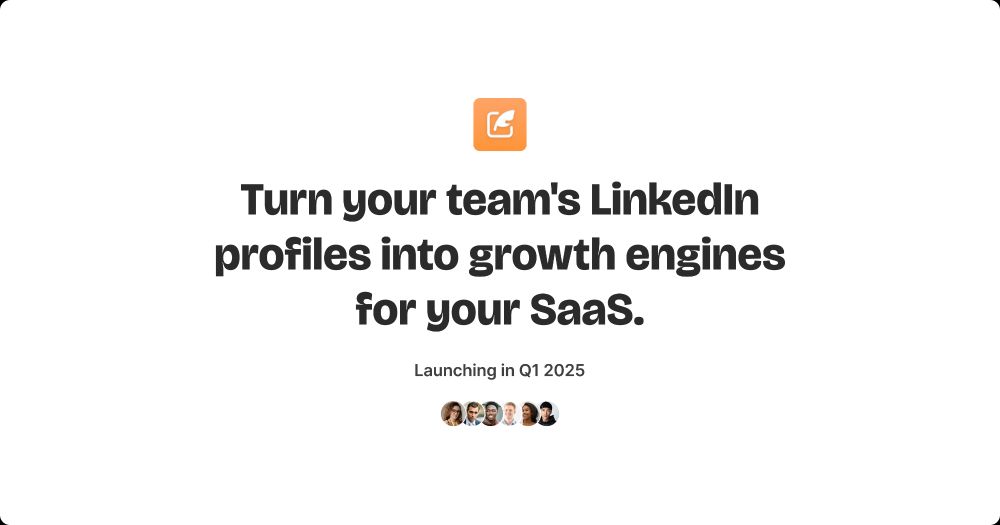great question...so basically we can just pick 14-days for the initial implementation and then look at user data once we're live with enough users to see a clear pattern?
13.02.2025 14:45 — 👍 2 🔁 0 💬 1 📌 0
How early on should you decide on a single use case for your product?
We have a clear ICP, but I can't decide if we should
a) Position ourselves solely as a tool employee advocacy on LinkedIn
b) Position ourselves solely as a tool for founder-led marketing on LinkedIn
c) say we do both
13.02.2025 14:44 — 👍 1 🔁 0 💬 1 📌 0
We are currently implementing the billing for our new SaaS and I can't decide if we should go with a 7-day trial or 14-day trial...
What should you offer when you initially launch your SaaS?🤔
11.02.2025 13:22 — 👍 2 🔁 0 💬 2 📌 0
I'm finally restarting my podcast🙈
Who here just reached 10k MRR with his SaaS and is open to sharing the marketing tactics he used to get there?
22.01.2025 17:41 — 👍 0 🔁 0 💬 0 📌 0
Question to the SaaS founders:
How focused is too focused in terms of marketing channels early on?
Is it a valid strategy to pick a single channel and completely ignore everything else until one hits 10K MRR?
20.01.2025 15:57 — 👍 0 🔁 0 💬 1 📌 0
Constant reminder I need for myself:
Do the basics. Again. And again.
Do fewer things better.
... I think I need to get a tattoo of this at some point😅
17.01.2025 16:41 — 👍 1 🔁 0 💬 0 📌 0
for sure!
16.01.2025 10:19 — 👍 0 🔁 0 💬 0 📌 0
In 5 minutes I'm going to be testing the alpha-version of my new SaaS startup for the first time.
I guess that's an experience only non-technical founders can relate to but damn I am either way to hyped or the three coffees I had are doing their job😅
16.01.2025 09:58 — 👍 0 🔁 0 💬 1 📌 0
yes it is
16.01.2025 06:30 — 👍 0 🔁 0 💬 0 📌 0
Assuming you did that.
What would be step 2?
16.01.2025 06:30 — 👍 0 🔁 0 💬 0 📌 0
If you had to (live or death) bring a bootstrapped SaaS to 25k MRR within 12 months, how would you all approach this?
15.01.2025 11:29 — 👍 2 🔁 0 💬 3 📌 0

Find and Hire React Developers for SaaS Startups
ReactSquad.io is the only marketplace of vetted React engineers fully focused on SaaS startups. Find affordable & reliable React, Next.js & Fullstack Developers within 48 hours.
maybe I'm a real pro at sucking at cold outbound?
(Which for sure is true)
But in all honesty:
We were doing it for ReactSquad.io and there are thousands of dev shops that are spamming everyone, so we likely immediately got mentally put into that bucket....
14.01.2025 15:43 — 👍 0 🔁 0 💬 1 📌 0
Here’s my life now:
Jamming with a content team that provides value to everyone seeing our content.
AND getting enough returns to double down on building a media flywheel.
To butcher the words of Jason Cohen
'There are a ton of ways to build a business. So pick the one you like the most.'
14.01.2025 14:08 — 👍 1 🔁 0 💬 0 📌 0
I f*cking hate cold outbound. Why?
Here’s my life at doing cold email in 2023:
Sending 25.000 personalized emails with a staff of 3 over a six-month period.
Hating my day-to-day because I'm hearing f-off from morning till night.
Getting a return of a whopping $0.
14.01.2025 14:08 — 👍 0 🔁 0 💬 2 📌 0
3. Focus on deep content that provides value to the people you're trying to sell.
13.01.2025 17:57 — 👍 0 🔁 0 💬 0 📌 0
1. You don’t need to be an Adam Robinson with his 111k followers to make 💰
➡️ It's about reaching the right people, not aiming for fame.
2. Get help from a marketer:
➡️ Founders are always overloaded and short on time, so he has a weekly 30-minute call, which the marketer uses to draft content.
13.01.2025 17:57 — 👍 0 🔁 0 💬 1 📌 0
I just got off the phone with a SaaS founder who started getting DMs from prospects after just a dozen posts...
To be honest..., it broke my mind a bit, even though I believe in LinkedIn as an acquisition machine. 🤯
Here are the 3 most important things we can learn from him:
13.01.2025 17:57 — 👍 0 🔁 0 💬 1 📌 0
The goal of SaaS marketing boils down to this one thing for me:
Getting into the consideration set.
Let’s face it—there isn’t a single product category out there that isn’t swamped with options.
Customers have more alternatives than they can possibly compare—or even know exist.
07.01.2025 13:16 — 👍 1 🔁 0 💬 0 📌 0
The funny thing is that planning comes naturally to me.
It’s like play—intellectually stimulating and a little addictive.
So, here’s the deal I’ve made with myself: planning is now a weekend-only hobby.
This year, I'm focusing on becoming a better SaaS marketer and creating content.
06.01.2025 14:30 — 👍 0 🔁 0 💬 0 📌 0
I wasted hundreds of hours planning in 2024 🫠
Over the past six years as a founder, I’ve experienced this:
Not a single plan ever survived contact with the real world.
06.01.2025 14:30 — 👍 0 🔁 0 💬 1 📌 0
My credo for 2025:
Do fewer things better.
02.01.2025 11:28 — 👍 1 🔁 0 💬 0 📌 0
I am prepping everything to incorporate in the US as a non-US citizen, and I must say...
It's not as bad as I thought!
German bureaucracy is so nasty that I was afraid it's the same in the US.
But hopefully, I'll not get any nasty surprises 😅
17.12.2024 08:04 — 👍 2 🔁 0 💬 0 📌 0
• Coordinate the pricing strategy.
• Gather all knowledge and insights from the different departments
• And arrive at a decision the whole company aligns with.. 💪
10.12.2024 16:03 — 👍 0 🔁 0 💬 0 📌 0
📣Marketing:
Creating buyer personas and responsible for product positioning, messaging, and benefits.
🤓 Management:
The startup's CEO should be the one to…
10.12.2024 16:03 — 👍 0 🔁 0 💬 1 📌 0
Simple - have a pricing committee with each department head.
Here are the insights each leader should bring to the table:
💸 Sales:
Bring objectives and FAQs from the frontline.
💻 Product:
Customer's needs and what they want to get out of your product.
10.12.2024 16:03 — 👍 0 🔁 0 💬 1 📌 0
5. Acknowledge that Pricing is at the heart of your SaaS Startup
Pricing touches every part of your company, as product, marketing, and sales all have to be aligned with the eventual positioning, packaging, and pricing strategy.
But how can you stick to this alignment?
10.12.2024 16:03 — 👍 0 🔁 0 💬 2 📌 0
✅ Segment discounts: Only target those needing an extra push to close.
✅ Limit in scope and time: Add a sense of urgency to make customers feel the need to buy NOW.
✅ Vary your offers: If your offers are predictable, customers will wait for the next discount to go live.
10.12.2024 16:03 — 👍 0 🔁 0 💬 1 📌 0
4. Discounting: How to use discounts as a SaaS company
Default answer: Don't Discount! ❌
If you decide to use a discounting strategy, follow these rules:
✅ Be discrete: Don't tell everyone. Those paying the full price may feel undervalued.
...
10.12.2024 16:03 — 👍 0 🔁 0 💬 1 📌 0
3. The Overlooked Pricing Metric: Revenue per Customer
📈Have 1 initiative per quarter to get APRU up.
This doesn't mean you need to increase prices each time, but tackle one opportunity like localization, packaging, or fine-tuning your value metric to grow your APRU.
10.12.2024 16:03 — 👍 0 🔁 0 💬 1 📌 0
Indie hacker - building tools to help you win at social media.
📈 All-in-one 𝕏 Growth Platform - https://snowball.club ($.5k/m)
I help people do their job with AI
Founder between Berlin and the Bay.
Recovering vc - now bootstrapping tipsiti.com. Ask me for travel recs 🚞 🌆 🏝️
🇳🇱 solopreneur http://indiepa.ge/pim - shipping 🚢 a few lines of code every day
bottyfier.com
Brew.dev (product dev agency) and Followergrow.com (X growth tool for iOS), prev Makery.co (exit in 2021).
Daily posts about tech, entrepreneurship, marketing.
I buy and run small profitable SaaS for small businesses at Noosa Labs.
Noosa Labs operates sendtric.com and Evalart.com
1st Exec @Checkr// Angel in 7 unicorns (Notion, Checkr, Crusoe, Womply, Spotter, PayJoy, Kin)
product designer x creative coder
building @mindone.app
danielfeles.com
2 decades of exp building business value through code.
Otelic.com - Affordable hosted Logs & Traces for your app. No monthly payments. So easy, junior can use.
#buildinpublic #opentelemetry #logs
Building MyColorElf (in under 48 Hours) 👉🏾 MyColorElf.com
Building MyStoryElf (6000+ Users) 👉🏾 MyStoryElf.com
#BuildInPublic
Design Engineer
Based in Stockholm, Sweden
Building stuff on the internet with the boys
📊 simpleanalytics.com: 34K MRR
🛜 unihosted.com: 6K MRR
Follow the journey: https://1millionarr.substack.com/
I create my freedom by making apps in solo without fundraising, and share it all in a podcast!
martin.solos.ventures
maker of capgo.app
Software Engineer - Open source contributor - Indie hacking - ouassim.tech
working on hookcn.ouassim.tech
maintaining forms.ouassim.tech
Junior Software Engineer @xlab_si / @ISL_Online
Full-stack software developer 👨💻 | Founder 💡 Startup & IndieHacker
Alex hormozi's new book launch event: https://shop.acquisition.com/pages/register?via=term
From 1981 | Developer | Coder | web/mobile app dev&consultant www.eekayonline.com | indiehacker, maker
🚧curr: linksee.io & aicodingtips.com (👉🏻Cursor AI Convo Export extension🔥)
✅prev: linqmeup.com
🔊 music:www.edsonkailes.com, focusedmakermusic.co
UI architect
Sharing innovative interfaces
Founder: tabextend.com / aconiti.com
🚀 Founder 🚀 Entrepreneur 🚀 Full Stack Developer
Freelance Developer & Indie Hacker building in public
🧠 yourgenlab.com: AI Agents for anyone
🚀 djast.dev: Django QuickStart Package
🕑 waitIist.com: Better WaitIist URLs
Analyse your 🦋 profile and get tailored post suggestions👇
bskycopilot.com
Tired of subscriptions? https://payoncealternatives.com 💰
Want more backlinks? https://www.effortlessbacklinks.com 📈

